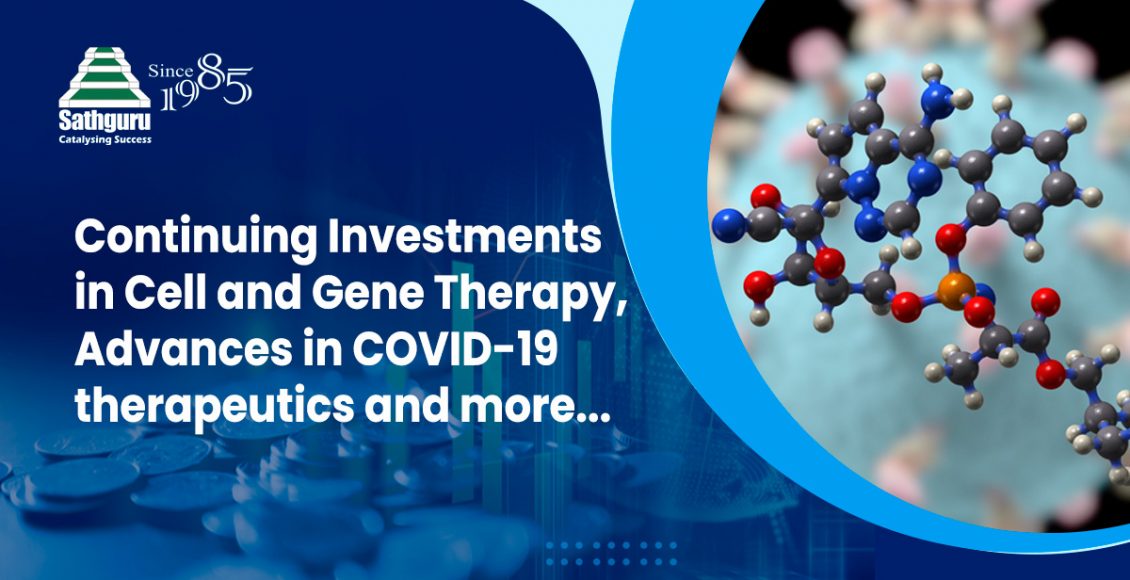
Investor confidence in cell and gene therapy continues to be high with young ventures attracting investors, both in the global regulated and emerging markets such as India. While clinical trials of a few cell and gene therapies have faced setbacks in the recent past, the overall outlook and growth potential remains positive for the sector and continues to attract funding.
Recent investments in the space include an investment of USD 250 million by Blackstone into a University College London (UCL) spinout, Autolus Therapeutics for the development of cell-based cancer treatment. The investment is a part of the private equity fund (USD 4.6 billion) set by Blackstone with a focus on investments in Life Sciences. Previous investments from the fund include, Alnylam Pharmaceuticals, Reata Pharmaceuticals and Medtronic. This investment in Autolus Therapeutics is the group’s first in cell therapy.
 The centerpiece of the investment is its leukemia therapy, obecabtagene autoleucel obe-cel, a clinical-stage CD-19 directed investigational CAR-T cell therapy designed to overcome the limitations in clinical activity and safety faced by the current CD-19 CAR-T cell therapies. As per the deal, Blackstone will make an equity investment of USD 100 million in Autolus and commit USD 50 million to finance the work on the experimental leukemia therapy, obe-cel. On meeting certain development and regulatory milestones, Blackstone could additionally pump in USD 100 million and, on Approval, would receive royalties on sales.
The centerpiece of the investment is its leukemia therapy, obecabtagene autoleucel obe-cel, a clinical-stage CD-19 directed investigational CAR-T cell therapy designed to overcome the limitations in clinical activity and safety faced by the current CD-19 CAR-T cell therapies. As per the deal, Blackstone will make an equity investment of USD 100 million in Autolus and commit USD 50 million to finance the work on the experimental leukemia therapy, obe-cel. On meeting certain development and regulatory milestones, Blackstone could additionally pump in USD 100 million and, on Approval, would receive royalties on sales.
The differentiating factor for obe-cel is that it has been designed to have lower toxicity, minimizing over-activation of the programmed T cells. Autolus collaborated with UCL for evaluating the therapy in its Phase I clinical trial in adult ALL and B-NHL. The company has also progressed obe-cel into the FELIX study, a potential pivotal study for treating relapsed/refractory (r/r) adult B-cell Acute Lymphocytic Leukemia (ALL) in patients 18 years and older. Other CAR-T therapies in its pipeline target neuroblastoma, prostate cancer, multiple myeloma et al.
Another investment came from Astellas investing in Dyno Therapeutics to develop adeno-associated virus (AAV) vectors for gene therapies. As part of the investment, Astellas will put in USD 18 million upfront and up to USD 1.6 billion in milestone and royalty payments. Under terms of the deal, Dyno Therapeutics will design the AAV capsids and Astellas will conduct all preclinical, clinical studies and commercialization. Astellas is the fourth company to join the big pharma league in collaborating with Dyno Therapeutics for its vector development deal portfolio, companies involved are Novartis, Sarepta Therapeutics and Spark Therapeutics. More on Dyno Therapeutics is available in our PharmForward post.
In emerging markets, companies are now gradually venturing into the next-gen cell therapy space with strategic or financial investments. Recently, in India, Laurus Labs invested USD 6 million to acquire a 26.62% stake in an IIT-Bombay spinout, ImmunoAct. ImmunoAct is the first to indigenously develop CAR-T cell therapies in India and has a lead candidate in pilot phase I clinical trial for B-cell lymphoma. Laurus Labs is a major supplier of generic medicines globally and the investment is part of a larger strategic interest to foray into biologics and other next-gen businesses. In 2020, Laurus Labs also acquired Richcore Lifesciences to expand into biologic manufacturing. Earlier in May 2021, Dr. Reddy’s exclusively in-licensed Pregene Biopharma’s anti-BCMA CAR-T cell therapy, PRG1801, for development and commercialization in India.
Growing momentum in the cell therapy space is not limited to regulated markets, it is progressively trickling down into emerging markets which aim to bring next-gen products that are best-suited for absorption in their local markets with context to different socio-economic profile and paying capacity of patients in emerging markets.
Research advancements have engendered multiple therapeutic alternatives for COVID-19, from developing novel molecules to re-purposing, multiple strategies have been utilized by pharma giants and stakeholders. The landscape has been evolving with long term data for some of the candidates either strengthening the said application claim or paving way for other candidates. Innovators have also pursued licensing of the drugs to generic manufacturers to expedite access in LMICs and LICs.
Pfizer’s Paxlovid, COVID-19 oral anti-viral candidate PF-073211332, in combination with low dose of ritonavir, an HIV medicine, has emerged as one of the potential oral treatments, with Phase 2/3 clinical data indicating 89% reduction in risk of hospitalization or death. Phase 2/3, EIC-HR focused towards study on non-hospitalized adult patients with COVID-19, with high risk of progression of severity, began in July 2021. Interim analysis for the trial was released during November first week. The study was performed over 28 days on 1881 enrolled adults, with no deaths among the cohort who received PAXLOVID as compared to 10 (1.6%) deaths in control cohort. In order to receive Emergency Use Authorization, the company will be submitting the data as part of rolling submission to US FDA. The candidate, if approved by regulatory authorities, will be prescribed as an at-home treatment having potential to reduce severity of illness and eliminate nine out of ten hospitalizations. The candidate, is first of its kind, an oral anti-viral with SARS-CoV-2-3CL protease inhibitor.
 Post release of the interim analysis data for PAXLOID, Pfizer and Medicines Patent Pool (MPP) entered a voluntary license agreement to undertake sub-licensees for the supply of the candidate to expand access in low and middle countries, to work towards equitable access for COVID-19 treatment. MPP will facilitate additional production and distribution of the investigational anti-viral post approval from regulatory authorities, by granting sub-licenses to selected generic manufactures worldwide, enabling supply to 95 countries, including all low- and lower-middle income countries and a few upper-middle-income countries in Sub- Saharan Africa. Pfizer will not be receiving royalties on sales in low-income countries and will waive royalties in other countries. MPP and Pfizer joining forces to enable access of COVID-19 drug in LMICs wasn’t the first one, it followed Merck and MPP entering a license agreement for molnupiravir earlier in October 2021, another oral antiviral COVID-19 medicine, for the treatment of mild to moderate COVID-19 in adults at risk, at affordable price range as well. 105 countries have been included under the agreement, to expand access of the drug post regulatory approval.
Post release of the interim analysis data for PAXLOID, Pfizer and Medicines Patent Pool (MPP) entered a voluntary license agreement to undertake sub-licensees for the supply of the candidate to expand access in low and middle countries, to work towards equitable access for COVID-19 treatment. MPP will facilitate additional production and distribution of the investigational anti-viral post approval from regulatory authorities, by granting sub-licenses to selected generic manufactures worldwide, enabling supply to 95 countries, including all low- and lower-middle income countries and a few upper-middle-income countries in Sub- Saharan Africa. Pfizer will not be receiving royalties on sales in low-income countries and will waive royalties in other countries. MPP and Pfizer joining forces to enable access of COVID-19 drug in LMICs wasn’t the first one, it followed Merck and MPP entering a license agreement for molnupiravir earlier in October 2021, another oral antiviral COVID-19 medicine, for the treatment of mild to moderate COVID-19 in adults at risk, at affordable price range as well. 105 countries have been included under the agreement, to expand access of the drug post regulatory approval.
 It is optimistic to see big pharma companies readily entering non-exclusive license agreements, in order to enable increased access at affordable price range, leveraging selected generic medicines manufacturers around the globe. Significance of such drugs can potentially be high in reducing the disease burden in these countries and load on their healthcare systems, which historically have seen increased pressure due to rise in hospitalization.
It is optimistic to see big pharma companies readily entering non-exclusive license agreements, in order to enable increased access at affordable price range, leveraging selected generic medicines manufacturers around the globe. Significance of such drugs can potentially be high in reducing the disease burden in these countries and load on their healthcare systems, which historically have seen increased pressure due to rise in hospitalization.
Xevudy (sotrovimab), another COVID-19 treatment effective in reducing hospitalization and death risk, received approval from Medicines and Health Products Regulatory Authority (MHRA) for people with mild to moderate COVID-19 infection and are at risk of developing severe disease. GSK and Vir Biotechnology product, sotrovimab, is the second monoclonal antibody receiving MHRA’s nod following Ronapreve. Clinical data indicates single dose of Xevudy reduced the risk of hospitalization and death by 79% in high-risk adults with COVID-19. It is administered by intravenous infusion for over 30 mins, approved for administration in individuals aged 12 and above. The US Government signed an agreement with GSK and Vir Biotechnology to purchase sotrovimab under a total value of USD 1 billion, bringing in more than 750,000 doses. Sotrovimab is FDA EUA authorized for the treatment of mild to moderate COVID-19 patients. The companies are undertaking pre-clinical studies to analyze the effect of the therapy over multiple variants of concern, including Delta and recently emerged Omicron. Pre-clinical data supports that sotrovimab retains activity against key Omicron mutations, a SARS-CoV-2 variant. The emergence of Omicron, a variant of concern, is recent and has already spread globally in nearly 38 countries. Albeit, limited information is available currently on transmissibility, disease severity and other relevant factors, multiple companies have initiated research and development activities against Omicron variant of concern, including Moderna, BioNTech, Novavax and Johnson & Johnson.
 Grow Beyond
Grow Beyond 

